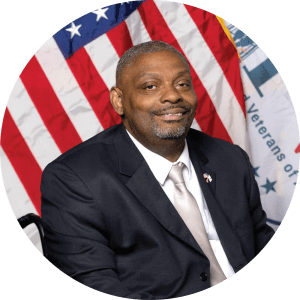PVA President’s Testimony: Championing Veterans’ Rights on Capitol Hill
 This past March, Paralyzed Veterans of America (PVA) National President and Chair of the Board Robert L. Thomas Jr., had the opportunity to speak before a joint hearing of the House and Senate Committees on Veterans’ Affairs.
This past March, Paralyzed Veterans of America (PVA) National President and Chair of the Board Robert L. Thomas Jr., had the opportunity to speak before a joint hearing of the House and Senate Committees on Veterans’ Affairs.
This testimony is an invaluable opportunity to instill in Congress the importance of veterans’ health care, benefits, civil rights and caregiver support.
Thomas provided his testimony March 6, and it’s the tradition of PN to publish president’s oral testimony from this hearing. This is his:
“Chairman [Jon] Tester, Chairman [Mike] Bost and members of the committees, thank you for the opportunity to speak with you today on behalf of the tens of thousands of veterans with spinal-cord injuries and disorders [SCI/D] who heavily rely on the benefits and health care available through the VA [Department of Veterans Affairs].
“The VA is the best health care provider for veterans with catastrophic disabilities. The department’s SCI/D system of care provides a coordinated, lifelong continuum of services. There is no comparable private system of care in the community. Thus, preserving and strengthening VA’s specialty care systems remains the highest priority for PVA, as it should be for you.
“Despite the Veterans Health Administration’s [VHA] hiring successes last fiscal year and the flexibility gained by workforce provisions approved by the previous Congress, staffing levels within the SCI/D system of care are not improving.
“We continue to see the same staffing deficiencies at the SCI/D centers year after year, which affects everything from the quality of the care received to employee safety and well-being at these facilities.
“We are extremely concerned with VHA’s decision to severely limit hiring in 2024. I urge you to monitor their hiring practices closely so veterans are not adversely affected.
“Another pressing need for PVA members is increased access to VA’s Home and Community-Based Services [HCBS]. As eloquently discussed by Senator Elizabeth Dole, passing her namesake legislation, the Elizabeth Dole Home Care Act, would make critically needed improvements to VA HCBS, such as lifting the department’s cap on the amount they can pay for home care, increasing access to the Veteran Directed Care [VDC] program and improving support to caregivers of veterans.
“The story of Andrew, an Air Force veteran who has ALS [amyotrophic lateral sclerosis], and his wife, Lisa, illustrates why this legislation must pass now. Andrew is currently bed-bound, paralyzed, vent-dependent and nonverbal. Lisa has had to work hard to secure the equipment and services needed to keep her husband alive and comfortable at home.
“Recently, they had to give up VDC in lieu of the Family Caregiver Program because expenses related to Andrew’s care were projected to exceed the cap later this year. This unnecessary disruption in the continuity of his care highlights the urgent need to eliminate the cap.
“I understand the provisions of the Elizabeth Dole Home Care Act are included in a larger package of legislation that is currently being considered by Congress. I cannot stress enough how important it is to get these provisions enacted into law now. Andrew and his family can’t wait any longer for the care he needs.
“Other veterans with SCI/D need to receive care at a specialized VA long-term care facility. Despite the grave need, the department’s capacity to provide such care is extremely limited. There are currently only six VA SCI/D long-term care facilities. Thus, veterans sometimes remain in the acute setting for months or years at a significantly greater cost because other placements, including in the community, are simply not available.
“We call on Congress to mitigate this shortage of long-term care beds by funding the six construction projects identified in my written statement and ensure existing facilities are fully staffed.
“Finally, neurogenic bladder and bowel dysfunction are common conditions among veterans with SCI/D, and they can lead to complications, re-hospitalizations and even death. Therefore, managing them requires ongoing, specialized attention.
“The VA can train and reimburse designated caregivers to provide this critical care, but the department’s current bowel and bladder program is fraught with problems like reimbursement delays. It lacks due process for the veteran. And unlike virtually all other VA payments, it imposes tax burdens on family caregivers.
“Harry Robinson, caregiver for his wife, PVA National Vice President Anne Robinson, pays about $3,500 a year in self-employment taxes out of his reimbursement for providing her with this life-sustaining care.
“Allowing family members to provide bowel and bladder care leads to better outcomes for the veteran and saves the VA money, but Congress must reduce the burden of providing care on veterans’ caregivers. Codifying the bowel and bladder program would allow Congress to address the tax burden and make other needed improvements.
“In closing, I would like to note that these are just a few of the many issues affecting catastrophically disabled veterans. Others include the need for improved travel support to help veterans receive needed medical care, increased HISA [Home Improvements and Structural Alterations] grant rates to provide critical housing modifications and better access to inpatient mental health care and substance use disorder treatment for veterans with SCI/D. Information about these and other issues of importance to paralyzed veterans are included in my written statement.
“Thank you again for this opportunity to share our views and your commitment to paralyzed veterans and their caregivers. I would be happy to answer any questions you may have.”


